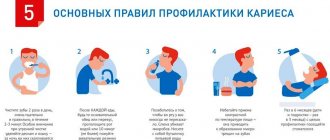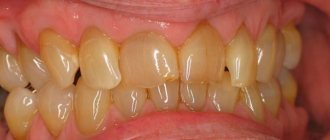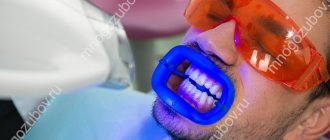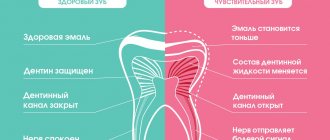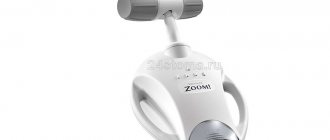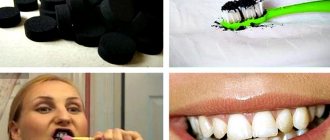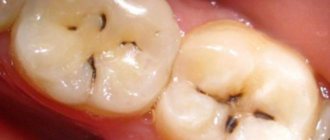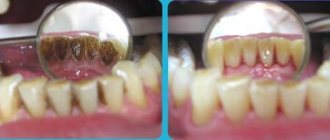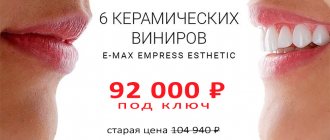Oral hygiene is a procedure whose main goal is to prevent the occurrence of oral diseases and maintain the integrity of the teeth. This is achieved by cleaning the oral cavity of excess substances (after eating) and daily brushing of teeth (usually in the morning and before bed). And the most popular cleaning method is with a toothbrush and toothpaste.
However, there are other ways to maintain oral hygiene. And they are often more effective than brushing your teeth. If you seriously care about your health, you need to think about putting these methods into practice.
Why is oral hygiene necessary?
The importance of oral hygiene lies in the prevention of major dental diseases, as well as maintaining an attractive appearance of a person. By following the rules for conducting events, you can achieve significant results, including:
- formation of strong teeth;
- destruction of pathogenic microflora;
- prevention of the development of caries and periodontal disease;
- prevention of infectious diseases of the oral cavity and gastrointestinal tract;
- snow-white smile;
- fresh breath;
- savings on dental services.
As medical practice has shown, people with weakened immune systems and smokers are especially in dire need of hygienic care.
Types of oral hygiene
To maintain the microflora of the oral cavity, in which the teeth and oral mucosa will always be healthy and aesthetically pleasing, there are a number of hygiene measures. They are divided into two main types: personal hygiene and professional procedures.
In the first case, oral care is carried out independently at home. According to the recommendations of dentists, the procedure should begin at an early age, when children have their first teeth.
If cleaning the mouth at home does not bring the desired result, the second method is used. Professional cleaning is carried out in a medical institution by a dentist.
Each method requires compliance with a number of rules. Therefore, in order for the procedures to be highly effective, it is necessary to familiarize yourself with them in more detail.
Option 2
The most famous and most studied disease is dental caries. Every day, dentists work tirelessly to eliminate it. Caries can affect the entire depth of the tooth, involve the nerve and completely destroy your tooth. Monthly scheduled checkups at the dentist will help not only keep the oral cavity safe and sound, but also save the family budget, since the cost of treating already affected teeth is significantly different from the cost of prevention.
The easiest and surest way to protect your teeth is to have a routine check-up with your dentist. Small caries is much easier to treat at an early stage before the entire tooth is affected. If the problem is not corrected in time, the caries will go inside the tooth.
Taking care of your teeth every day is the only sure way to prevent dental caries and tartar. To cleanse food debris, you can chew fresh carrots or apples. This method will mechanically clean your teeth and interdental spaces. Rinsing your mouth after eating, before and after sleep should be done daily. Small particles of food and plaque on teeth cannot be cleaned with a regular toothbrush.
Avoid or limit your intake of foods and drinks that are high in sugar. It negatively affects the health of your teeth as it destroys the enamel. After this, caries freely penetrates the tooth and destroys it. It is impossible to restore enamel, so you need to remember this from a very young conscious age.
You need to choose a toothpaste based on the characteristics of your oral cavity. Don't focus on taste or cheapness. Consult with your dentist which toothpaste and toothbrush is best for you. The modern market offers a huge selection of dental hygiene products. Choosing the right one will not be difficult.
Use a special floss to remove food particles between your teeth. Under no circumstances should you “pick” your teeth with a needle or match. This can injure the gums and spread infection to the jaw, and this is fraught with more serious consequences than caries.
Dental care is not difficult. A systematic, planned visit to the dentist and daily brushing of your teeth will protect you from oral problems.
Rules for carrying out hygiene procedures
In order for your personal oral hygiene to ensure thorough cleaning and create an attractive smile, you must purchase special cleaning products in advance and then follow the rules of the event.
Accessories for the procedure
Oral care is usually carried out using special cleaning products, including:
- Toothbrush for cleaning teeth, cheeks, tongue.
- Toothpaste for the prevention and treatment of diseases.
- Brushes for removing food residues in interdental crevices.
- Rinse to complete the procedure.
When it is not possible to brush your teeth, dental floss is used. To eliminate bad breath and small food particles after eating, it is recommended to use sugar-free chewing gum.
Rules for cleaning teeth
Oral hygiene rules depend on the choice of cleaning product. Using a toothbrush, the procedure is carried out as follows:
- The cleaning attribute is rinsed with running water.
- Apply a small amount of toothpaste to the bristly surface of the brush.
- At an angle of 45 degrees relative to the gum, the attribute is located in the open mouth.
- The upper teeth are cleaned from top to bottom using smooth, circular movements.
- The lower jaw is cleaned from bottom to top.
The above manipulations are carried out within 3 minutes. After this time, the toothbrush is turned over and the tongue is cleaned with a rubber nozzle. At the end of the procedure, the oral cavity is rinsed with warm water or a special rinsing solution.
When using dental floss, proper oral hygiene is carried out in the following order:
- For a one-time procedure, dental floss 40-50 cm long is cut.
- The thread seeps into the interdental crevices with smooth movements.
- Having reached the surface of the gum, the thread is directed in the opposite direction in a similar way without sudden movements.
Having cleaned one interdental gap in this way, move on to another. In this case, the thread must be clean for each section.
If the above hygiene measures do not get rid of plaque deposits on the teeth, dentists recommend professional cleaning.
Carrying out professional cleaning
Oral hygiene with professional help is carried out to eliminate accumulations of soft plaque, which over time develops into tartar. When a hard stone forms, a person loses his attractive appearance. In addition, against the background of this pathology, concomitant dental diseases develop.
To prevent these negative phenomena, the dental hygienist prescribes measures using medical instruments and special equipment.
Rules for preliminary examination
Before proceeding with professional intervention, the dentist must first carefully examine the patient. Medical methods of oral hygiene depend on the following diagnostic indicators: caries intensity index, hygienic index, assessment of the condition of the mucous membrane, type of bite, and the presence of dental pathologies.
After assessing the condition of the oral cavity, the specialist must form a responsible attitude towards the prescribed procedure in the patient. It is important that a person understands that medical oral hygiene can completely get rid of periodontal disease and improve the external condition of teeth.
Carrying out procedures
A medical complex of measures to remove persistent dental tumors can be carried out therapeutically, orthodontically or surgically. Each event is conducted by a dentist in a medical office.
In order for professional oral hygiene to go smoothly, before it begins, the patient is prescribed rinsing the nasopharynx with an antiseptic solution.
For major operations, anesthetic medications may be used, in the form of sprays or injections. The professional cleaning complex includes several stages.
Elimination of plaque and tartar. An ultrasonic device is used for this. In some cases, manual mechanical cleaning with dental instruments is used.
Removing pigmented plaque. A popular device for cleaning teeth from soft plaque is the AirFlow device. As a result of the pressure of the emitted water, air and soda, the enamel becomes lighter by 2 shades.
Polishing teeth. This method uses professional products that contain zirconium microparticles.
Fluoridation. This method involves strengthening the enamel with fluoride-containing gel trays. The procedure lasts only a minute, but during this time the enamel has time to become saturated with fluoride ions, due to which it becomes stronger.
Fissure sealing. This method involves using composite resins to fill the grooves of the teeth on the chewing side using a special tool.
Many patients neglect professional procedures, as well as the visit to the dentist itself. However, this position is fundamentally wrong.
By contacting a specialist in a timely manner, you can avoid dangerous pathologies of the oral cavity, as well as receive recommendations for daily care so that individual oral hygiene brings significant benefits.
The benefits of professional teeth cleaning, its features
Professional teeth cleaning gets its name from the fact that it is carried out by a specialist, using professional tools and technologies that make it possible to qualitatively remove both light plaque and a more complex form - tartar. After the procedure, the teeth, gums, and subgingival pockets are completely freed from plaque, and the oral cavity is cleansed of pathogenic bacteria. At the same time, the teeth return to their beautiful, natural color and shine. Comprehensive teeth cleaning is one of the ways to take good care of the health and beauty of your teeth.
In what cases is it necessary to have professional teeth cleaning:
- If you want to keep your teeth beautiful, strong and healthy for a long time. Professional hygiene helps prevent the occurrence of caries and gum inflammation;
- After undergoing complete dental treatment to maintain the achieved positive result over time;
- Before the procedure of treatment, prosthetics, orthodontic dental treatment, implantation. Thanks to comprehensive cleaning before dental treatment, the condition of the gums improves, it becomes possible to detect caries in the early stages of development, whiten the enamel to a natural shade and simplify the process of installing fillings.
There are no contraindications to the procedure of professional teeth cleaning, but there are restrictions on some techniques, so only the attending dentist can correctly select the set of necessary procedures.
Next, information about the stages of professional teeth cleaning will be presented in more detail to make it more clear what benefits this procedure brings.
Recommendations for oral hygiene
In medical practice, there are certain rules for the technique of cleaning the mouth. Compliance with them does not require much effort or difficulty.
Oral hygiene recommendations from experts:
- To maintain the microflora in the mouth and the strength of the teeth, it is necessary to follow a balanced diet of dairy and legumes.
- To brush your teeth, it is better to choose a brush with synthetic bristles.
- The cleaning attribute should be replaced every 3-4 months.
- Clean your mouth with a toothbrush and toothpaste 2 times a day. The first procedure is carried out in the morning, the second before bedtime.
- Various oral hygiene practices should include cleaning the tongue and gums. This will be a good means of preventing periodontal disease.
- After each procedure, the toothbrush must be thoroughly rinsed with running water.
- It is recommended to clean the spaces between teeth after every meal. To do this, you can use dental floss or special wooden sticks.
- It is better to entrust the monitoring of the condition of the oral cavity to the dentist.
- Professional hygiene should be carried out 1-2 times a year by a qualified specialist.
- For hard-to-reach areas of the mouth, it is advisable to purchase specialized tools, such as a brush and floss.
- Don't neglect mouthwashes either. Their regular use contributes not only to fresh breath, but also to the strength of the enamel structure.
It is recommended to explain the rules of oral care to a child from an early age. In this case, the cleaning procedure will become an integral part of a person’s life, which will significantly reduce the risk of pathologies in the oral cavity.
Tips for caring for your teeth after professional cleaning
To ensure that the results of professional teeth cleaning last as long as possible, the following recommendations should be followed:
- In the first few days after professional cleaning, teeth should be brushed not only in the morning and before bed, but also immediately after meals. If this is not possible, after eating, rinse your mouth with drinking water or a specialized mouthwash;
- Use the paste and brush that suits you. If you find it difficult to choose, contact a dentist who knows the characteristics of your teeth and gums. He will definitely help you make the right choice. Remember that the optimal duration of brushing your teeth is 3-5 minutes. Do not forget to clean your teeth from different sides, pay attention to cleaning your gums and tongue;
- In the first days after professional cleaning, you may experience increased tooth sensitivity. Don't worry, this is a temporary phenomenon that will subside in a couple of days. Temporarily avoiding eating too hot or cold foods and drinks will help get rid of discomfort.
- Abstaining from smoking for several days is another necessary measure to preserve the natural whiteness and shine of your teeth for as long as possible.
- It will also be useful to exclude coloring foods and drinks from the diet (coffee, soy sauce, chocolate, etc.);
- Avoiding sour and overly sweet foods, as well as nuts, candies and hard fruits will help reduce the level of tooth sensitivity;
- If professional teeth cleaning has been completed with fluoridation, you should abstain from food for at least 2 hours and do not brush your teeth before going to bed.
Despite the long list of recommendations from dentists, it is necessary to understand that professional teeth cleaning will bring noticeable results if the procedure is carried out regularly. Any disease, including the oral cavity, is easier to prevent than to treat. Therefore, you should not neglect the rules of hygiene and put off brushing your teeth in the morning and before bed.
How to independently determine the need for professional cleaning?
Deciding whether you need professional teeth cleaning or not is quite simple; all you need to do is look in the mirror and assess the current condition of your teeth. If they have a yellowish tint, have brown spots, gums that are red or bleeding, and an unpleasant odor in your mouth, then you should definitely contact a professional and get a professional teeth cleaning.
In addition, it is worth understanding that you should not wait for all these symptoms to see a dentist. This approach can lead to problems against which professional teeth cleaning alone will not be enough. For this reason, you need to come for preventive professional teeth cleaning in advance to avoid more dangerous problems. Moreover, it is carried out quite quickly.
How often should you have professional teeth cleaning?
This is a very pressing question for many, but it is worth understanding that there is no straightforward answer to it. If it is necessary to carry out preventive cleaning in order to prevent the occurrence of caries, to increase the overall service life of installed fillings or other elements of the oral cavity, then such cleaning should be carried out once every 6 months. Depending on the specifics of a person’s problems, he may be prescribed more frequent professional teeth cleaning. In a separate category are those who actively smoke, drink alcohol, or have problems with the gastrointestinal tract or bite. In such people, harmful plaque accumulates much faster, which is why they require more frequent teeth cleaning.
Once every 3-4 months, it is worth carrying out such cleaning for people who have dentures in the oral cavity. If there is periodontitis, then a deeper cleaning will be required, which affects the subgingival pockets. This type of cleaning is performed with hand tools and performed by a periodontist, as it requires different knowledge and equipment than that used by a hygienist.
In order to have beautiful and snow-white teeth, it is important to eliminate caries, if necessary, perform prosthetics, and later have professional teeth cleaning to keep them healthy and beautiful.
How much does it hurt?
This type of cleaning does not cause pain, but some patients claim that they experienced pain when removing plaque or tartar. This can actually happen due to some reasons not related to the fact that the hygienist works with his instrument:
- inflammation in the gums;
- exposure of the necks or roots of the teeth.
Unpleasant pain can also occur if tartar in the area of periodontal pockets is removed. They can also occur when mineralized plaque has accumulated in large quantities. In this case, the specialist will first administer anesthesia to reduce pain. But the presence of such problems requires not only cleaning, but also other treatment.
Are there any restrictions on professional teeth cleaning for pregnant women?
Pregnancy requires a woman to be more careful about her health. It is also worth paying attention to your teeth, but very often the question arises about how much professional teeth cleaning is acceptable in this condition, and whether it will harm the female body or the unborn baby?
Such cleaning may well be carried out, but it is very important to take into account the duration of pregnancy. If we are talking about the first and third trimester of pregnancy, then cleaning cannot be done. The second trimester of pregnancy allows such cleaning if the general health is at a good level, and the gynecologist with whom the woman is being observed has not prescribed cleaning as a contraindication.
If you decide to come for a cleaning, be sure to inform the dentist that you are pregnant, tell the exact date, then the specialist will be able to choose the safest and most appropriate cleaning option for you.
Are there any restrictions for children and teenagers?
There is a misconception that you can’t take care of the health of baby teeth, because sooner or later they will fall out anyway and will be replaced by permanent teeth. Following this opinion may lead to the fact that due to the removal of baby teeth ahead of time (this may be necessary if they are neglected), difficulties will arise with the eruption of permanent teeth. For this reason, it is very important to closely monitor even baby teeth and carry out professional teeth cleaning in a timely manner to avoid the development of caries.
Laser and ultrasonic cleaning is not used in this case, since for a growing organism in which the hard tissues of the teeth have not yet formed, this can be a rather harmful procedure. To solve the problem, gentle cleaning with a professional paste is suitable. It will strengthen your teeth and prevent tooth decay.
The Ulybka Clinic has not only professional specialists, but also all the necessary equipment that will allow children to feel comfortable. In special rooms, the child will be able to watch educational cartoons while the dentist performs cleaning. In addition, our specialist will definitely tell the young patient about why it is so important to monitor the health of his teeth.
Professional cleaning and braces
If you are trying to correct your bite and have braces installed, then you should come for professional cleaning at least once every 4 months. When wearing braces, achieving the desired level of hygiene on your own can be very difficult, especially for those teeth on which the structure is installed.
If you do not use professional teeth cleaning, caries may soon develop. To treat it, you will need to remove braces, and this will lead to additional stress and new financial expenses. In addition, all achieved orthodontic changes can be reduced to zero.
At Ulybka Dentistry, we provide a professional, comprehensive approach to teeth cleaning, which helps to avoid all of these difficulties.
Consequences of neglecting hygiene rules
Failure to comply with the rules of oral hygiene, at best, will lead to bad breath and the development of caries. But, as medical practice has shown, such neglect will have more serious consequences.
A large accumulation of harmful bacteria in the absence of hygiene procedures or their improper implementation contributes to the development of the following pathologies:
- Gingivitis. This is an inflammatory process of the gums that affects the alveolar process of the jaw. The pathology is accompanied by putrid breath, bleeding gums when brushing teeth individually, itching and a negative perception of the taste of food.
- Candidiasis. This inflammatory process develops when Candida bacteria enter the mouth. In pathology, swelling of the oropharynx and a white coating on the tongue are observed. In an advanced form of the disease, erosions may appear on the surface of the oral mucosa.
- Periodontitis. This pathology affects periodontal tissue. Symptoms of periodontitis include the formation of hard stone, tooth mobility, and the presence of purulent or serous discharge.
- Stomatitis. Such damage to the lining of the mouth occurs due to the proliferation of infectious microorganisms. When bacteria enter the human body, they destroy the surface structure of the gums, tongue and cheeks. Subsequently, ulcers appear on the affected areas.
As you can see, each pathology develops due to the entry of harmful bacteria into the oral cavity, where there is an optimal habitat for their growth and reproduction. Only careful daily oral care can correct this phenomenon.
Category Miscellaneous Published by Mister dentist
